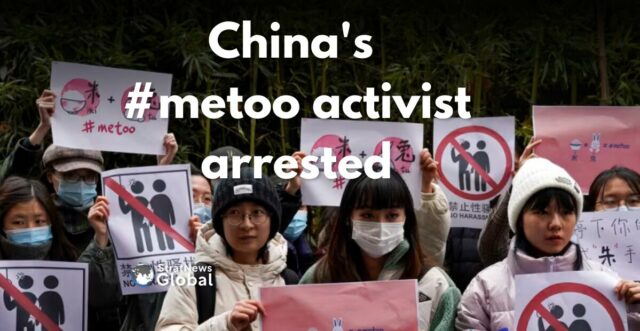Leading Chinese #MeToo activist Huang Xueqin has been sentenced to five years in prison after being found guilty of subverting state power, according to a group campaigning for her release and a copy of the verdict.
Huang, a 35-year-old independent journalist, plans to appeal the decision, her supporters said. Labour activist Wang Jianbing, 40, who stood trial alongside Huang, received a sentence of three years and six months. It is not clear if Wang will appeal his sentence.
A spokesperson for the Free Huang Xueqin and Wang Jianbing group said Chinese authorities were using national security as a pretext to suppress social welfare activists. “This is a denial and obliteration of the value of social justice as well as a denial of moderate voices in civil society. This is a very bad sign,” the spokesperson said, requesting anonymity for safety reasons.
#BreakingNews: The verdict in the #XueBing case was delivered this morning. #HuangXueqin received a five-year prison sentence, and #WangJianbing was sentenced to three years and six months. Huang Xueqin declared in court that she would appeal. pic.twitter.com/eHvtmgttse
— Free Huang Xueqin & Wang Jianbing 释放雪饼 (@FreeXueBing) June 14, 2024
Huang and Wang have been detained since September 2021. Saturday June 14 will mark 1,000 days since their arrest. During their closed-door trial last year, they denied any wrongdoing. The charges of sedition were based on gatherings they held for Chinese youth to discuss social issues.
Consular representatives from the United States, Denmark, France, Germany, New Zealand, and the UK were denied entry to the court proceedings. Diplomats, speaking anonymously, confirmed a heavy security presence around Guangzhou People’s Intermediate Court on Friday morning.
Amnesty International’s China Director, Sarah Brooks, stated, “These convictions will prolong their deeply unjust detention and have a further chilling effect on human rights and social advocacy in a country where activists face increasing state crackdowns.”
The charge of “inciting subversion of state power” is often used by the Chinese government against dissidents and can carry a maximum prison term of five years, which may be extended if the suspect is considered a ringleader or has committed serious crimes. Sentences include time served.
Chinese foreign spokesperson Lin Jian defended the country’s actions, stating, “China firmly opposes any country or organisation challenging China’s judicial sovereignty.”
The day before her arrest on 19 September 2021, Huang was scheduled to fly to Britain to begin a master’s degree at the University of Sussex on a British government-funded scholarship.
Huang, who reported on Chinese #MeToo allegations and the 2019 Hong Kong protests, was detained for three months in late 2019. Both activists were placed in solitary confinement for several months.
Earlier this year, Li Qiaochu, another Chinese activist for women’s and labour rights, was sentenced to three years and eight months for “inciting subversion of state power.” She has been detained intermittently for four years and is due to be released in August.
With Inputs From Reuters





